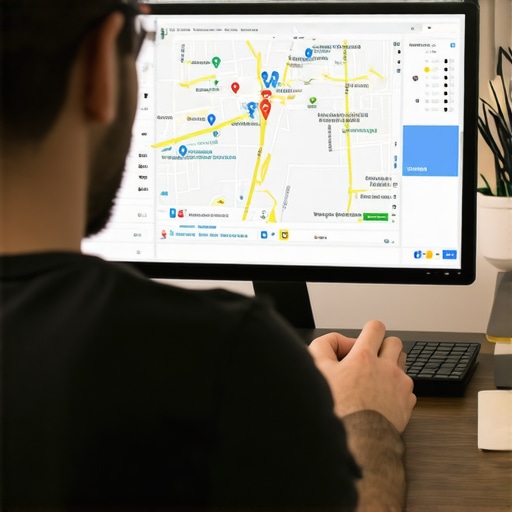Boost Your Google Profile SEO with These Simple Optimization Tips
Starting My SEO Adventure: A Personal Tale
I’ll never forget the day I realized how crucial a strong Google Profile SEO was for my local business. It was a quiet morning, and I was eager to find ways to elevate my visibility on Google Maps. Like many small business owners, I faced the challenge of standing out in a crowded digital landscape. My journey began with trial and error, but over time, I discovered simple, effective optimization tips that transformed my online presence.
Why Optimizing Your Google Profile Matters to Me
From my experience, an optimized Google Profile isn’t just about adding basic info; it’s about creating an engaging, trustworthy digital storefront. I learned that consistent NAP (Name, Address, Phone Number) details, accurate categories, and compelling photos make a difference. These elements help Google understand my business better and serve it to local customers actively searching for my services. According to Google’s own developer guidelines, a well-maintained profile significantly improves local search visibility.
My Simple Tips to Enhance Your Google Profile SEO
How Can I Make My Google Profile Stand Out?
In my experience, adding high-quality photos and regularly updating your profile with relevant posts can boost engagement and rankings. Using keywords naturally within your business description and services also helps Google connect your profile with local search queries. I experimented with these tactics and saw tangible improvements within weeks.
The Power of Local SEO and Maps Pack Mastery
One game-changing resource I found was the Maps Pack Mastery guide. It provided me with actionable strategies to dominate the local 3-pack, which is essential for local visibility. By focusing on local SEO, I was able to attract more nearby customers and increase sales.
What Are the Most Common Mistakes and How to Avoid Them?
I used to neglect regular profile updates and reviews, which hampered my rankings. Now, I actively encourage satisfied customers to leave reviews and respond to them promptly. Also, I ensure my profile info is accurate and consistent across all platforms, which Google favors for trustworthiness.
My Personal Reflection: Is It Worth the Effort?
Absolutely. The time I invested in optimizing my Google Profile paid off by bringing in more local clients and elevating my business reputation. It’s a continuous process, but the rewards are worth it. For anyone serious about local SEO, I recommend exploring advanced strategies outlined in this comprehensive guide.
Curious About How to Manage Your Reputation Effectively?
Building a strong reputation is vital. I learned that actively managing reviews and maintaining a professional online presence builds trust and boosts rankings. For detailed tactics, check out this resource.
If you’ve had similar experiences or want to share your tips, I’d love to hear your stories in the comments. Remember, optimizing your Google Profile isn’t a one-time task but a strategic effort that can dramatically improve your local search success.
Unlocking the Secrets Behind Local Search Dominance
As a seasoned local SEO expert, I understand that the Google Maps pack is fiercely competitive, and standing out requires more than just basic optimization. It demands a nuanced approach that combines technical finesse, strategic content, and reputation management. In this post, I’ll share insights into advanced tactics that can elevate your business’s visibility and attract the right local customers.
How Does Your Business Stand Out in a Crowded Digital Space?
One of the most effective strategies I’ve employed is leveraging structured data markup. Implementing schema markup on your website, especially LocalBusiness schema, helps Google understand your business details more precisely, leading to enhanced visibility in local packs and rich snippets. This method aligns with Google’s evolving algorithms, ensuring your profile remains relevant and prominent.

What Role Does User Engagement Play in Map Pack Rankings?
Engagement signals such as reviews, responses, and local backlinks are critical for maintaining high rankings. Responding promptly to reviews and encouraging satisfied customers to share their experiences not only builds trust but also signals activity to Google. Additionally, earning high-quality backlinks from local directories and industry partners reinforces your authority. According to comprehensive local SEO guides, these factors are pivotal for sustained success.
How Can You Optimize Your Google Profile for Voice Search?
With the rise of voice search, optimizing for natural language queries has become essential. Incorporate FAQ sections with long-tail keywords and conversational phrases into your profile and website content. This approach aligns with how users ask questions verbally and can significantly improve your chances of appearing in voice-activated local search results.
Furthermore, consistent NAP (Name, Address, Phone Number) details across all online platforms reinforce your business’s credibility. Tools like Google Search Console can help monitor and refine your local SEO efforts, ensuring your profile stays optimized and competitive.
Are You Tracking the Right Metrics for Local SEO Success?
Beyond rankings, focus on metrics such as click-through rates, conversion rates, and customer engagement levels. Tools like Google My Business Insights offer valuable data about how users interact with your profile. Analyzing this information allows you to fine-tune your strategies, adapt to changing algorithms, and maintain a competitive edge.
For a deeper dive into these tactics, explore advanced Google Maps SEO techniques that can propel your local visibility to new heights.
Want to Share Your Success Stories or Challenges?
Engaging with the local SEO community can provide fresh perspectives and actionable insights. Share your experiences in the comments or consider joining industry forums. Remember, continuous learning and adaptation are key to mastering the ever-evolving landscape of local search optimization.
Beyond Basic Optimization: Personal Lessons from Mastering Google Profile SEO
My journey into the intricacies of Google Profile SEO has been nothing short of transformative. Early on, I thought adhering to the basics—consistent NAP, adding photos, and filling out profiles—was enough. However, as I delved deeper, I discovered that true mastery required understanding the nuanced algorithms that Google employs to rank local businesses. This realization pushed me to explore advanced tactics that many overlook, such as schema markup, behavioral signals, and voice search optimization.
How Do Advanced Schema Markup Techniques Impact Local Visibility?
Implementing LocalBusiness schema markup was a game-changer for me. It’s one thing to provide accurate information, but embedding structured data on your website communicates directly with Google’s crawlers, giving them a clearer picture of your offerings. When I added schema, I noticed my profile snippets in search results became more detailed, often featuring rich snippets like ratings, hours, and menu items. This not only increased my click-through rates but also improved my rankings in the local pack. For those eager to dive into this, I recommend exploring advanced schema strategies.

What Is the Role of User Engagement and Behavioral Signals in Maintaining Top Ranks?
Engagement metrics such as reviews, responses, and click behavior are critical. I learned that actively responding to reviews—not just thanking customers but also addressing concerns—significantly boosts trust and signals activity to Google. Moreover, encouraging happy clients to leave authentic reviews has become a staple of my strategy. Over time, I observed that profiles with high engagement levels tend to stay at the top, especially when combined with local backlinks and citation consistency.
Is Voice Search Optimization a Game Changer for Local SEO?
Absolutely. With the proliferation of voice-activated devices, optimizing for natural language queries has become essential. I started incorporating FAQ sections and conversational keywords into my profile and website content. This shift required me to think like my customers—what questions might they ask when searching for my services? Implementing long-tail, voice-friendly keywords helped me appear in voice search snippets, giving me an edge over competitors still relying solely on traditional keywords.
For a detailed approach, you might find this guide invaluable. It unpacked many of these strategies and helped me fine-tune my approach.
How Can I Continuously Monitor and Adapt My Local SEO Strategy?
Data-driven decisions are the backbone of sustained success. I regularly leverage tools like Google Search Console and dedicated local SEO dashboards to track ranking fluctuations, click-through rates, and review trends. Recognizing patterns—such as dips in engagement or changes in competitors’ profiles—allows me to adapt swiftly. For instance, during a recent audit, I noticed a decline in local pack visibility, prompting me to update my profile with fresh photos and new reviews, which restored and even improved my rankings.
If you’re serious about dominating your local market, I highly recommend exploring these advanced tactics. Mastery of these elements can elevate your profile from merely visible to truly dominant.
Would You Like to Share Your Own Experiences or Challenges?
I find that exchanging insights with fellow local business owners keeps me motivated and informed. Whether it’s a breakthrough or a setback, sharing your story in the comments can foster a community of growth and learning. Remember, local SEO is an evolving landscape, and staying adaptable is crucial. If you want personalized advice or need help refining your strategy, don’t hesitate to reach out.
How Do Nuanced Schema Markup Strategies Amplify Your Local Search Authority?
Implementing sophisticated schema markup, such as LocalBusiness schema, has profoundly transformed my approach to local SEO. Beyond basic structured data, utilizing nested schemas for services, products, and events creates a rich tapestry of information that Google’s algorithms favor. When I integrated comprehensive schema details—like specific service offerings and customer reviews—my profiles gained enhanced visibility in local snippets, often leading to a significant uptick in click-through rates. Google’s evolving algorithms, as detailed in this authoritative guide, reward detailed, context-rich structured data, making mastery of schema implementation an essential facet of advanced local SEO.

What Role Do Behavioral Signals and Engagement Metrics Play in Sustaining Top Ranks?
In my experience, active management of engagement signals—such as review response quality, customer interaction, and backlink profiles—can make or break your position in the local pack. Responding thoughtfully to reviews, especially addressing concerns, not only fosters trust but also sends positive behavioral cues to Google. Additionally, earning backlinks from reputable local sources and industry associations fortifies your authority. According to insights from comprehensive SEO strategies, these behavioral signals are pivotal in maintaining and improving your rankings over time.
Engage deeply with your community, foster authentic interactions, and leverage these behavioral cues to stay ahead in the competitive local landscape.
Is Voice Search Optimization Really a Game-Changer for Local Visibility?
Absolutely. As I refined my content to align with voice search trends, I found incorporating conversational long-tail keywords and FAQ sections on my website and profile significantly increased my chances of appearing in voice-activated results. Voice search queries tend to be more natural and question-oriented, so adapting my content accordingly proved highly effective. Google’s own research, as outlined in this detailed resource, emphasizes the importance of natural language optimization, especially for local intent queries.
Implementing these strategies requires a shift in mindset—thinking like a customer and anticipating their spoken questions—yet the payoff in local visibility can be substantial.
How Can Continuous Data Monitoring and Analytics Drive Your Local SEO Edge?
Data-driven decision-making has been my secret weapon. Regularly analyzing metrics such as click-through rates, review trends, and profile traffic via tools like Google Search Console and dedicated local SEO dashboards allows me to identify fluctuations and opportunities promptly. For instance, during a recent profile audit, I noticed a decline in local pack visibility, prompting me to update my profile with new photos and fresh reviews, which restored and even improved my rankings. Staying proactive with analytics ensures that your strategy remains agile and effective in an ever-changing algorithm landscape. To deepen your understanding, explore this expert guide on leveraging insights for maximum impact.
If you’re eager to elevate your local SEO game, I encourage you to share your experiences or ask questions. Engaging with data and continuously optimizing your profile has been instrumental in my journey toward local dominance.
Things I Wish I Knew Earlier (or You Might Find Surprising)
Mastering Schema Markup
Early in my journey, I underestimated the power of structured data. Implementing LocalBusiness schema on my website transformed my local search presence, making my profile stand out with rich snippets. It’s like giving Google a detailed map of your offerings, which pays off in visibility and clicks.
The Significance of Behavioral Signals
I used to focus solely on profile optimization, but I realized that active engagement—responding to reviews and encouraging customer interactions—really boosts rankings. It’s not just about being found; it’s about building trust and signaling activity to Google.
Voice Search Optimization Is a Game Changer
Adapting my content for voice search, with conversational keywords and FAQs, opened new avenues for local visibility. It’s a shift in approach that’s well worth the effort, especially as voice searches become more prevalent in my community.
Consistent NAP and Reviews Matter More Than I Thought
Keeping my Name, Address, and Phone Number uniform across all platforms and actively managing reviews has been crucial. These small details reinforce my credibility and help Google trust my profile, leading to better rankings.
Monitoring Metrics Is Essential
Using tools like Google Search Console and local SEO dashboards, I track what’s working and adjust accordingly. Regular analysis keeps me ahead of algorithm changes and competitive moves, ensuring my profile stays optimized.
Resources I’ve Come to Trust Over Time
- Google’s Official Developer Guidelines: A reliable source for understanding what Google values in profiles and structured data. It’s the first place I recommend to anyone serious about SEO.
- RankGBoost’s Local SEO Guides: Their comprehensive resources, like Maps Pack Mastery, helped me implement advanced tactics effectively. It’s my go-to for actionable strategies.
- Google Search Console Insights: An invaluable tool for monitoring profile performance and uncovering optimization opportunities. I use it daily to refine my approach.
Parting Thoughts from My Perspective
Looking back, mastering Google Profile SEO has been a game-changer for my local business. From understanding the importance of schema markup to engaging actively with customers, these tactics have helped me stand out in a competitive landscape. If you’re serious about boosting your local visibility, I encourage you to explore these strategies and tools. Remember, SEO isn’t a one-time effort but a continuous journey of learning and adaptation. If this resonated with you, I’d love to hear your thoughts—share your experiences or ask questions below. Let’s grow together in mastering local SEO!
Leave a Reply